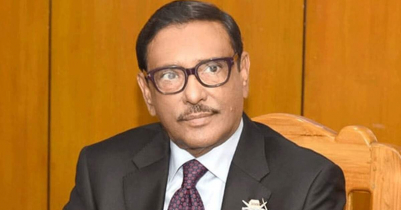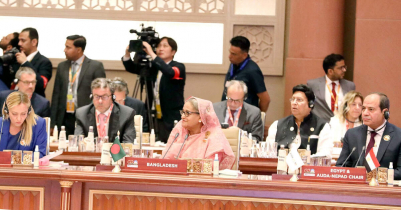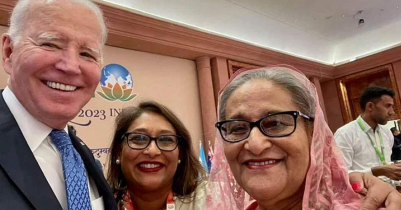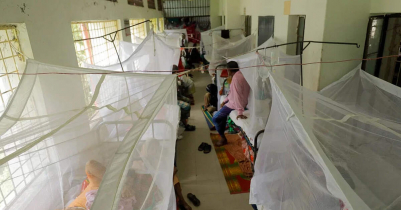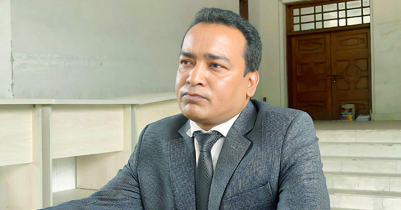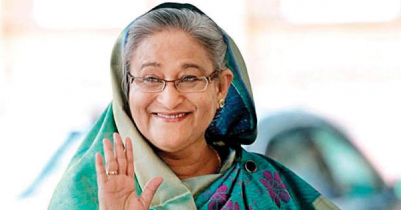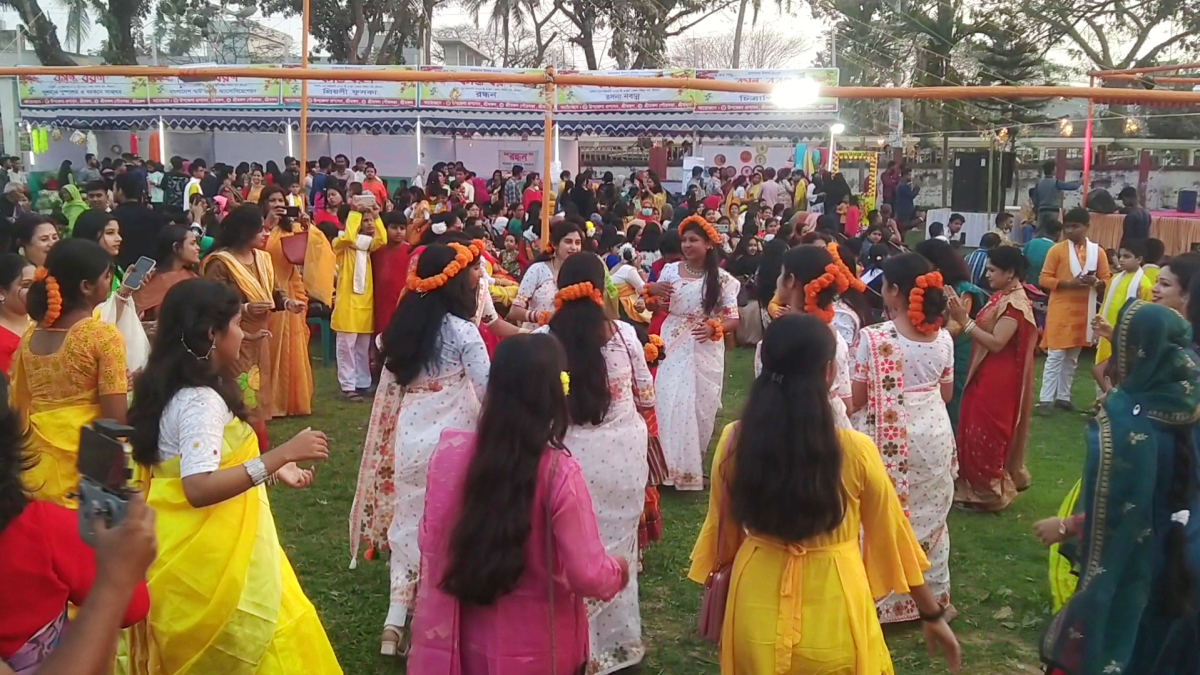Staff Reporter
Bangladesh`s socio-economic development gets global appreciation
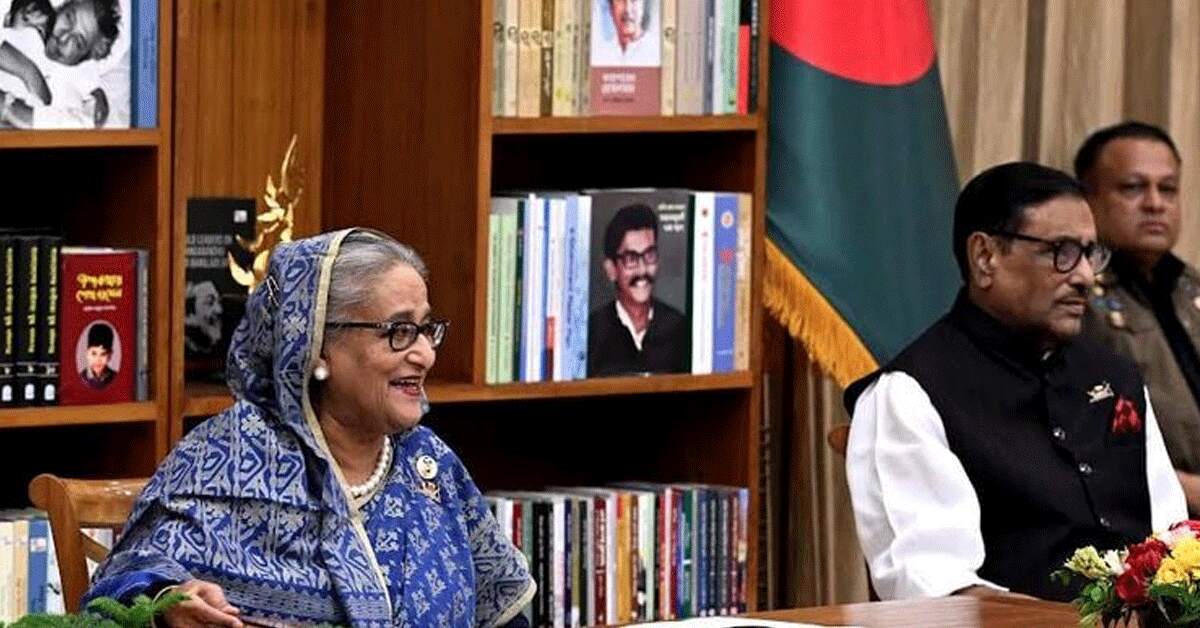
Prime Minister Sheikh Hasina at a press conference at her official Ganabhaban residence here today highlighted different important issues about her recent tri-nation visit to Japan, the United States and the United Kingdom (UK).
In her written speech, the Prime Minister said during her bilateral meetings, all including Japanese Prime Minister, UK prime minister and World Bank chief highly appreciated Bangladesh's remarkable socio-economic development under her leadership.
They also assured of their continuing support to her government to turn Bangladesh into a 'Smart Bangladesh" she added.
Following is the full text of the written speech:
Bismillahir Rahmanir Rahim
Dear journalist brothers and sisters,
Colleagues,
Assalamu Alaikum. Good Afternoon.
Welcome to you all to this press conference.
At the outset, I am grateful to Almighty Allah for saving us from the massive loss of life and property due to the very severe cyclonic storm 'Mocha'.
\We had taken enough preparations to minimize the damage. I myself took constant inquiries and gave various instructions.
We opened 7040 cyclone shelters in 13 coastal districts. More than 7.5 lakh people took shelter in the cyclone shelters. Directives have been given to take up rehabilitation activities quickly in the affected areas.
Dear Journalists,
From April 25 last to May 8, 2023, I visited Japan, the United States, and the United Kingdom. I returned to the country on May 9.
VISIT TO JAPAN:
At the invitation of Japanese Prime Minister Fumio Kishida, I arrived in the Japanese capital of Tokyo on April 25, 2023.
In the morning of April 26, I paid a courtesy call on His Majesty Emperor of Japan Naruhito.
His Majesty Emperor welcomed me and expressed hope that the relations between the two countries would deepen further.
In the evening on that day, the Japanese Prime Minister welcomed me to his office with conferring a guard of honour on me.
Later, a formal bilateral summit between the heads of government of the two countries was held at the Japanese Prime Minister's office. Concerned ministers including Honorable Agriculture Minister and Honorable Foreign Affairs Minister and high level government officials were present in the meeting.
Through my visit, the bilateral relationship between Bangladesh and Japan has been elevated to a 'Strategic Partnership'.
In the meeting, issues that include concluding an Economic Partnership Agreement between the two countries as soon as possible, strengthening regional connectivity through the BIG-B project, developing economic infrastructure, creating an investment-friendly environment, re-launching the Japan Overseas Cooperation Volunteers Project, increasing trade, Japanese investment in Bangladesh's special economic zone, free Indo-Pacific region, Dhaka-Tokyo direct flight etc. were discussed.
The Japanese government assured that it will provide 30 billion yen to Bangladesh as budget support assistance.
In the meeting, I extended thanks to the Japanese government for its cooperation for the Rohingyas in Bhasanchar and sought Japan's cooperation to send the Rohingyas back to their country quickly.
At the outset of Strategic Partnership between Bangladesh and Japan, a total of eight instruments and memorandums of understanding on agriculture, metro rail, industrial upgrade, ship recycling, customs matters, intellectual properties, defence cooperation, ICT and cyber security cooperation were signed between the both countries.
Besides, I and Japanese Prime Minister signed a joint statement on the outline of bilateral relations between Bangladesh and Japan. Later, I attended a dinner held in my honor at the residence of the Prime Minister of Japan.
Apart from the summit, some bilateral meetings were held between the two countries.
Foreign Minister of Japan, President of JICA, Chairman and CEO of JETRO, Chairman of Japan-Bangladesh Committee for Commercial and Economic Cooperation (JBCCEC) and President of Japan-Bangladesh Parliamentary Friendship League (JBPFL), wife of late Japanese Prime Minister Shinzo Abe and President of JEBIC paid courtesy call on me.
On April 27, I joined a meet-and-greet event with CEOs and business leaders of Japan's leading business organizations at the Westin Hotel in Tokyo.
Later, I attended the Bangladesh Business Summit organized at the same hotel. The President of Japan Chamber of Commerce and Industries in his speech lauded the economic development and trade potential of Bangladesh.
Citing the existing political stability and the unprecedented development achieved in recent years, I called for greater investment and trade in Bangladesh. A total of eleven memorandums of understanding were signed between the business leaders of the two countries.
Later, I visited Japan's National Museum of Emerging Science and Innovation (Miraikan Museum). In the afternoon, famous Japanese architect Tadao Ando met me.
A memorandum of understanding was signed between Tadao Ando Architect and Associates and Bangladesh National Museum for the establishment of a children's library in Dhaka.
In the afternoon on that day, I attended an award giving ceremony at Akasaka Palace to present the 'Friends of Liberation War Honour' to four Japanese nationals for their special contribution to the Bangladesh Liberation War.
The awardees are: Mr. Tadateru Konoe, former president of the International Red Cross Society, Professor Gyalpo Pema, politician Mr. Hideo Takano (posthumous) and photojournalist Mr. Taizo Ichinose (posthumous).
In the afternoon on that day, I gave interviews to NHK and Nikkei media.
Later, I attended a civic reception hosted by Bangladeshi expatriates in Japan at the Westin Hotel in Tokyo.
VISIT TO THE USA:
On April 28, I arrived in Washington DC, the US capital, at the invitation of World Bank President David Malpass on the occasion of the 50th anniversary of the partnership between Bangladesh and the World Bank.
On the first day of my visit to the United States in the afternoon of April 29, Ms. Kristalina Georgieva, the Managing Director of the International Monetary Fund, paid a courtesy call on me.
During the meeting, she praised Bangladesh's significant progress in infrastructural development, communication and maintaining of law and order and the stability of Bangladesh's macro economy even during the Covid-19 pandemic.
The IMF managing director expressed her opinion that the leadership like the current government is needed in Bangladesh to take the country forward on the road to prosperity by facing all obstacles.
She called Bangladesh as a role model of the world in terms of overall development. I called upon the managing director of the IMF to continue the IMF's cooperation in various ongoing socio-economic development initiatives of the government of Bangladesh. On the same day, I was interviewed by Voice of America, a US-based media outlet.
In the morning of May 1, I addressed, as the chief guest, a discussion titled "Reflection on 50 years of Bangladesh-World Bank Partnership" on the socio-economic development of Bangladesh at the World Bank headquarters.
In my speech, I called upon the World Bank and other international organizations to continue their cooperation in the journey of building a knowledge-based 'Smart Bangladesh' by 2041. At the event, World Bank President David Malpass lauded Bangladesh's incredible success in increasing per capita income and reducing poverty.
He said that Bangladesh's success in various indicators including poverty alleviation, combating climate change and women's empowerment is an example for other developing countries. David Malpass expressed the commitment that the World Bank will continue its cooperation and support to Bangladesh in its development journey.
In the programme, I said the present situation gives an indication of our economy's growth opportunities and its adaptability. Bangladesh has never defaulted on its debt repayment, or fallen into a so-called debt trap.
When Bangladesh was born in 1971, many development experts were skeptical about the country's future.
In the efforts to build Father of the Nation Bangabandhu's Sonar Bangla, our people have shown the world that even difficult challenges can be overcome through determination.
Prime Minister Sheikh Hasina has presented a painting of the Padma Multipurpose Bridge to the World Bank President David Malpass.
At the end of the event, I presented a bound photo of the Padma Bridge to World Bank President David Malpass.
At the end of the discussion, in the presence of me and the President of the World Bank, five loan agreements worth $2.25 billion were signed between the government of Bangladesh and the World Bank for the development of regional trade and connectivity, disaster preparedness and environmental management.
On behalf of Bangladesh, Economic Relations Division Secretary and on behalf of the World Bank, its Country Director for Bangladesh signed the agreements.
The agreements are-
1. Resilient Infrastructure Building Project: It is a US$50 crore (500 million) project. It is the first major investment project to implement the 'Delta Plan 2100', which will help improve disaster preparedness against inland flooding.
2. Bangladesh Environmental Sustainable and Transformation (BEST) Project: It is a US$25 crore (250 Million) project.
3. Accelerating Transport and Trade Connectivity in Eastern South Asia (ACCESS) Bangladesh Phase-I: It is a US$75 crore 34 lakh and 50 thousand (753.45 million) project.
4. First Bangladesh Green and Climate Resilient Development (GCRD) Project: It is a US$50 crore (500 million) project. It will help the country's transition to green and climate-resilient development.
5. Sustainable Microenterprise and Resilient Transformation (SMART) Project: It is a S$25 crore (250 Million) project.
On the same day, I and WB President inaugurated a multimedia exhibition highlighting development stories of Bangladesh, marking Bangladesh-WB partnership over the 50 years. I also held a meeting with WB Board of Directors.
In the morning of May 2, Ajay Banga, the next president of the World Bank, paid a courtesy call on me. During the meeting, I called on the World Bank to stand by Bangladesh in building "Smart Bangladesh".
On the same day, I had a private meeting with senior executives of the US-Bangladesh Business Council.
Besides, as the chief speaker, I addressed a high-level meeting with leaders of top US business organizations. In my speech, I highlighted the investment-friendly initiatives and incentives undertaken by the Bangladesh government to the US business delegation and put a special emphasize on the importance of expanding trade between the two countries.
At the event, among others, Prime Minister's ICT Affairs Advisor Sajeeb Wazed Joy also highlighted the socio-economic situation and investment environment in Bangladesh.
President and Chief Executive Officer (CEO) of the US Chamber of Commerce Suzanne P. Clark paid a courtesy call on me.
Besides, 'The Economist' took an interview of me in the evening. At that evening, I attended a reception accorded by Bangladeshi citizens living in the United States.
After all, the visit of Bangladesh delegation to Washington D.C. in the US to mark 50 years of partnership between Bangladesh and the World Bank is a reflection of the World Bank's strong partnership with Bangladesh in its development journey.
THE UK VISIT:
I visited the UK from May 4 to 8 in response to an invitation from His Majesty the King to attend the coronation and reception for him and Queen Camilla and to attend the Commonwealth Leaders event at the invitation of the Commonwealth Secretary General.
At the afternoon of May 5, a reception was held for His Majesty King Charles III and Queen Camilla at Buckingham Palace. On May 6, the coronation ceremony of the King and the Queen took place at Westminster Abbey in London. I attended both the reception and the coronation ceremony. I exchanged greetings with His Majesty King Charles III at the Commonwealth Leaders event held at Marlborough House.
At that time, I congratulated the King and the Queen and invited them to visit Bangladesh. At the afternoon of May 5, I attended the Commonwealth Leaders event organized by the Commonwealth Secretary General at Marlborough House.
On the same day, I had a meeting with UK Prime Minister Rishi Sunak at Marlborough House. I congratulated Rishi Sunak on being the first person of Asian heritage to become the UK Prime Minister. He praised our role we played in various international forums, including climate change, and providing houses to the landless and homeless people of Bangladesh at government expense. I call for more investment in Bangladesh from UK companies.
He praised the economic progress of Bangladesh. He also praised Bangladesh for providing shelter to Rohingyas on humanitarian ground in Bangladesh. I thanked the UK for its continued support on the Rohingya issue. I invited the UK Prime Minister to visit Bangladesh to see the plight of the Rohingyas and he responded positively.
On May 6, UK Foreign Minister James Cleverly paid a courtesy call on me at my hotel suite in London. The UK foreign minister said that climate change and renewable energy are at the centre point of the British King's interests. Bangladesh is an important country to the King because of the strong position of Bangladesh in these two cases. He said that Bangladesh-UK Climate Accord and Aviation Partnership will play an important role in advancing the relations between the two countries in the future.
Bhutanese King Jigme Khesar Namgyel Wangchuck and Queen Jetsun Pema, who were also visiting the UK, paid a courtesy call on me at my hotel suite. At that time, my younger sister Sheikh Rehana was present at the meeting.
Commonwealth Secretary General Baroness Patricia Scotland paid a courtesy call on me on May 7. She offered me to be the Commonwealth Artificial Intelligence Champion.
She appreciated Bangladesh's achievements in digitization, e-governance etc. and requested to exchange Bangladesh's experience in these sectors with other developing countries of the Commonwealth.
Besides, she urged Bangladesh to organize a conference of Commonwealth Environment Ministers before the next COP-28.
On the same day, former British Prime Minister Tony Blair also paid a courtesy call on me.
I attended a civic reception at a local hotel in London on May 7. And I gave an interview to the BBC during this visit.
During my this visit, a Joint Communique, on Aviation Trade and Investment Partnership was signed between the government of Bangladesh and the government of the United Kingdom.
On behalf of the UK government, Minister of State in the Department for Business and Trade Lord Dominic Johnson and on behalf of the Bangladesh government, my Adviser on Private Industry and Investment Affairs Mr. Salman F Rahman signed the Joint Communique.
In this Joint Communique, interest was expressed regarding cooperation between the two countries in the aviation sector, exchange of experience, and in making Bangladesh's aviation sector efficient, safe and sustainable.
I do believe that Bangladesh-UK relations will advance further through this visit. I also do believe that Bangladesh's position in the Commonwealth will be strengthened.
I end my written statement here.
Khoda Hafez
Joy Bangla, Joy Bangabandhu
Bangladesh Chirajibi Howk (Long live Bangladesh).
Read More
- A fire broke out in Bongo Bazar
- Takrim again first in the International Quran Competition
- Bangladesh Chhatra League full committee announced
- Today is the birthday of the father of the nation
- Enayetullah Abbasi may be banned in UK!
- Sheikh Hasina will be elected for the fourth term : Bloomberg
- Fire in Bongo Bazar: Mamun lost everything
- I will help victims of Bongo Bazar : Prime Minister
- UK PM sees Sheikh Hasina as his inspiration
- Fire in Bongo Bazar : DSCC forms probe committee



